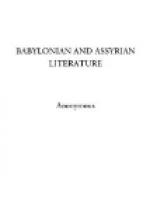Thy dream he will reveal, O Sar!
Its meaning show to Izdubar,
Victorious king of war.”
Within the council halls now lead the seers
With trepidation and with many fears,
To hear the seer explain their monarch’s dream.
Beside the royal throne he sits supreme
Among the seers, the Sar, his scribe commands
To read his dream recorded as it stands
In Erech’s Gi;[2] who reads it to the seer,
Who answers thus:
“In
this there doth appear
A god, whose ardent love will lead to deeds
Of hate against thee, Sar; thy present needs
Are great, O king! as fire this love will burn
Until the wicked seven[3] on thee turn;
And blood, alone, will not their fury sate:
The gods will hurl upon thee some dread fate.”
In silence, Izdubar the warning heard;
His blood with terror froze, and then was stirred
By passions wild, when he recalled the scene
Of Ishtar’s love for him by man unseen;
When she so wildly then proclaimed her love;
And now with hate his inmost soul doth move,
And her bright form to a black dal-khu[4] turned
And furious passions on his features burned.
And then of the first dream he thought, and light
Across his vision broke:
“’Tis
true! aright
Thy seer hath read! for Ishtar came to me
In the first dream, her face e’en yet I see!
Aye, more! her lips to mine again then fell!
Her arms I felt around me,—breath too well
I know! of fragrance, while perfume arose
Around my dream and fled not at the close;
As frankincense and myrrh it lingered, when
I woke. Ah yes! the queen will come again!”
Then to his counsellor who wondering stood,
Nor heard his murmuring, but saw subdued
His features were, at first, and then, they grand
Became with settled hate; he raised his hand;
“’Tis true!” he said, “Reward
on him bestow!
Then to the waiting feast we all shall go.”
[Footnote 1: “Su-khu-li ru-bi,” attendants of the King.]
[Footnote 2: “Gi,” literally a written tablet, a record.]
[Footnote 3: The seven wicked spirits of the earth, air, and ocean.]
[Footnote 4: “Dal-khu,” an evil spirit, a demon.]
COLUMN VI
IZDUBAR SLAYS THE MIDANNU IN THE FESTIVE HALL, AND HEABANI DECLARES HIM TO BE A GOD
The guests are seated round the festal board;
Heabani takes his seat beside his lord.
The choicest viands of the wealthy plain
Before them placed and fishes of the main,
With wines and cordials, juices rich and rare
The chieftains all enjoy—the royal fare.
This day, with Izdubar they laugh and joke
’Mid courtesies and mirth, and oft provoke
The ringing merry laughter through the halls.
When all are satisfied within the walls,
Their fill have eaten of the royal fare,
With wine they banish from them every care.




